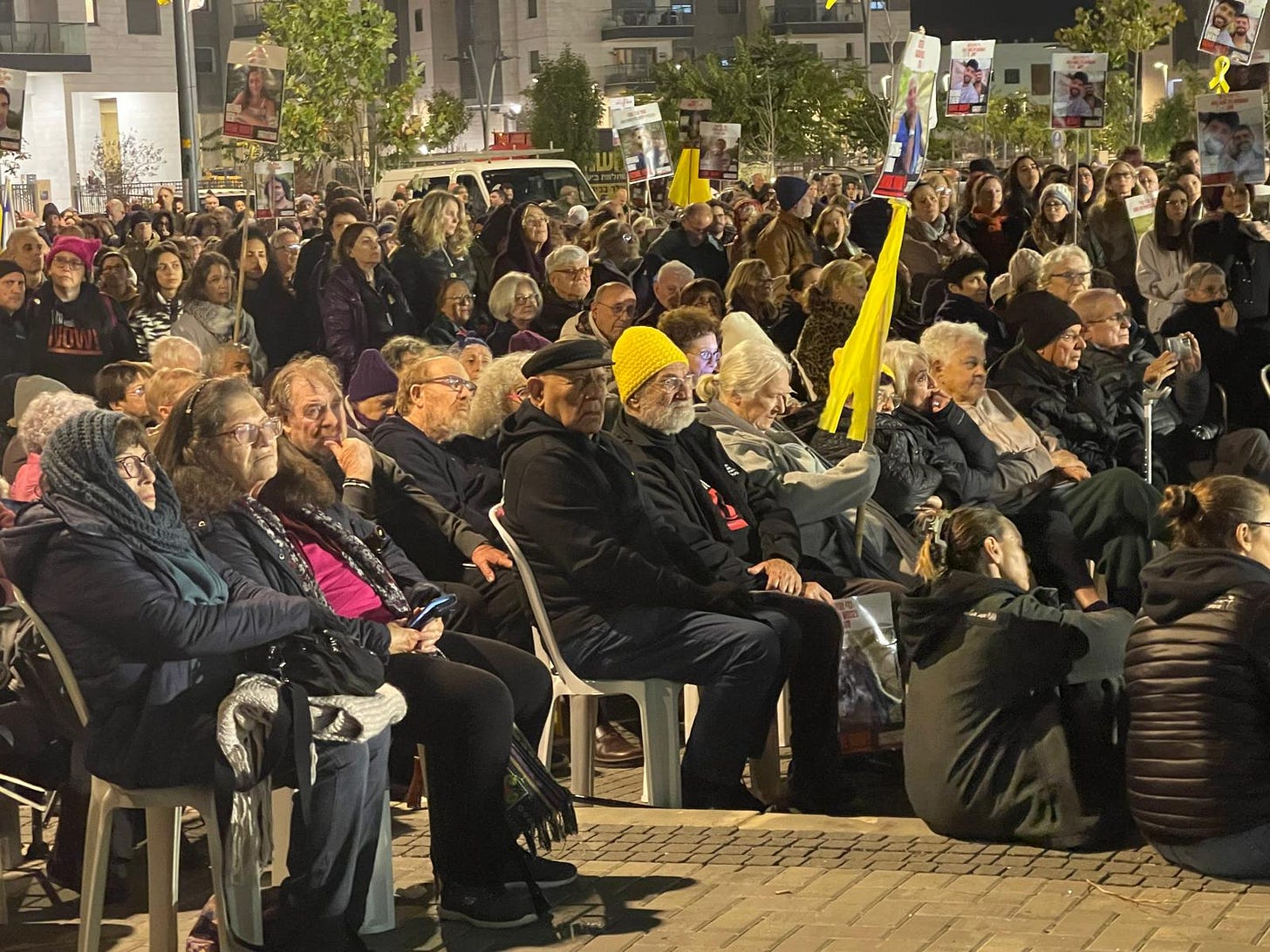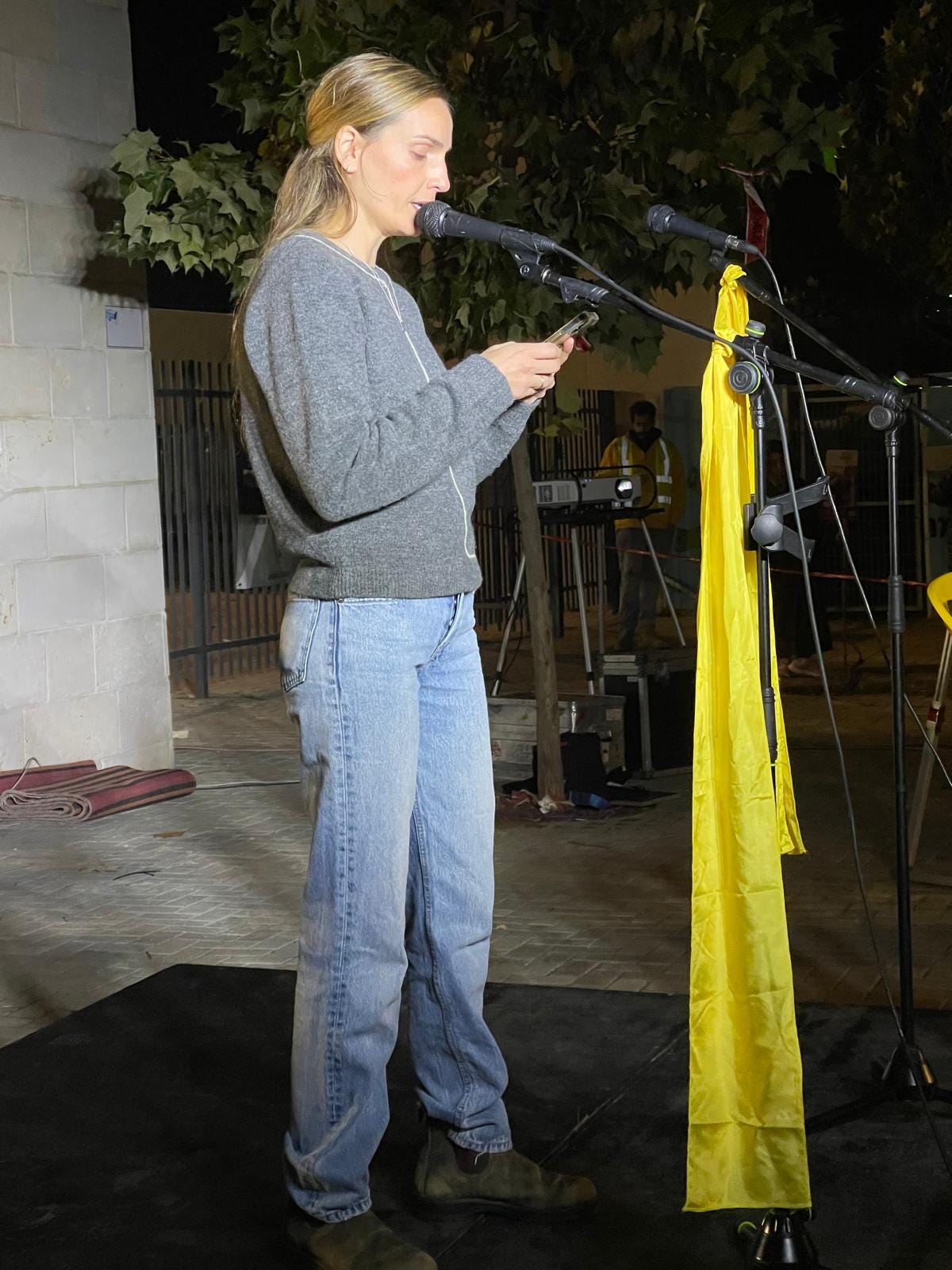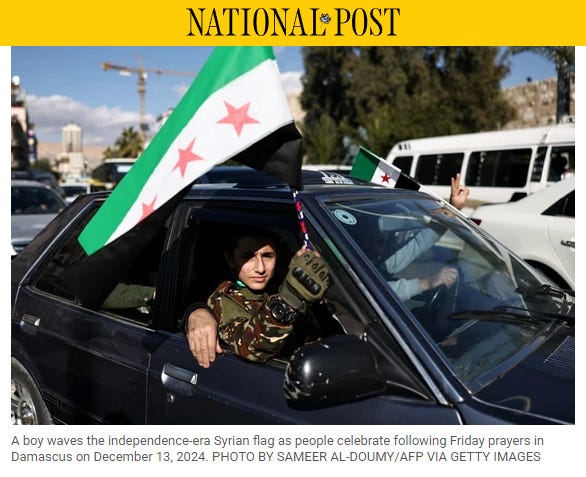Saturday Night in Kiryat Gat
Where Be’eri and Nir Oz survivors gather, hoping
As we near the end of 2024, it is with disbelief that I find myself still attending support rallies every Saturday night for the 100 hostages still in Hamas captivity and their families.
Last night, I went to Kiryat Gat, a southern town where most of the survivors from two border kibbutzim—Be’eri and Nir Oz—are now living. Each rally location in Israel has a unique vibe. And this one? Had the air of a little village. You could see and feel the interpersonal familiarity. This was not a gathering of strangers.
One speaker—a therapist who survived October 7 on Nir Oz—told us that the trauma her patients share and confide is surreal. So difficult to receive and process. She can find no support or guidance in any professional literature or clinical experience. Overnight, her practice was hit by a cyclone, as were the lives of so many of those assembled last night in Kiryat Gat.
Children, babies, teens, parents, and the elderly. The scope of trauma suffered by these communities has changed everything, forever. And in Kiryat Gat the sense of shared destiny was palpable. Small children ran around freely, as they grew up doing on the kibbutz. Teens crowded to sit on a ledge close to the stage. Seated directly behind them were the grandparents. Some were wearing yellow beanie hats. It was chilly. Everyone wears yellow. Or they may carry a sign bearing the photo of a hostage. But there is always something palpable.
Front row last night at Kiryat Gat
Last night was raw. Yet again, the government is engaged in talks with Hamas, through mediators, to negotiate the release of the hostages. The country is deeply divided. Should Israel insist on all hostages being released at the same time? Or accept a staged deal? PM Netanyahu (who has spoken in recent days with foreign media, shunning domestic outlets) has made clear that he will negotiate a staged deal. The release of all hostages at once, he says, will not happen until Israel withdraws fully from the Gaza Strip. And that will not come to pass until Hamas is—as he puts it—“destroyed.”
What that actually means in real life remains ambiguous. How destroyed is “destroyed”? Hamas is saying they will release humanitarian cases (one would have thought that all hostages—dead and alive—qualify at this point), children and women. But then they apparently get fuzzy and indicate that some hostages who may fall into these categories would be “considered” soldiers. I fear that translates, in plain English, to this: “We will not release the female IDF soldiers we hold hostage.”
On Saturday night, we learned that Hamas has requested a “time out” from the negotiations in order to locate and “assess” the hostages and their condition. Insanity. (Keep in mind, Israeli and foreign media never stop providing new information. So, I am doing my best to filter. There is a lot I will not repeat here until it is verified by a reliable source.)
On the news tonight, Sunday, reports regarding the negotiations were somewhat bleak. Significant gaps remain between Hamas and Israel. The anchor informs us that Jake Sullivan, President Biden’s National Security Adviser, remains hopeful. A tepid endorsement, at best.
Among the survivors of October 7 speaking last night in Kiryat Gat was Avital, wife of Sagui Dekel Chen, father of their three young daughters. The youngest was born one month after he was taken hostage.
Avital spoke of the brutal reality of her young children. They have seen and heard more in their short lives than most of us ever will. The questions they ask, so innocent yet profound. And she has no answers. She spoke so eloquently for the release of all, questioning how, after so much time, the government could even consider distinguishing between “classes” of hostage.
Sagui may be among those released in a first “tranche” because he holds American citizenship. Of the 100 hostages remaining in Gaza, it is believed that he is alive, along with two other Americans, IDF soldier Edan Alexander and Kfar Aza resident Kieth Siegel. Hamas has signaled in recent weeks that they may consider releasing hostages with American citizenship.
Avital told us that her soul is shattered.
You stand in the presence of people like Avital and the larger community, and your heart hurts. Physical pain. And as she stepped down from the stage, having finished her remarks, two of her little girls ran over to hug their mother.
As you may have noticed, State of Tel Aviv and Beyond has debuted on YouTube. We will continue to post on this site but it would be great if you subscribe on YouTube as well. Audiovisual content will be cross-posted there… and, yes… I’d appreciate your help in promoting this new venture. Our initial post was a one hour interview with Professor Gad Sa’ad, author of The Parasitic Mind and internationally renowned social and political critic. Have a look and listen if you haven’t watched it already.
I have also posted my recent piece from the National Post (Canada), which ran on Friday, in which I attempt the impossible; to bring some kind of order and clarity to the mess in Syria and the implications for the broader region. Oh—and I get into the Trump Effect—which is everywhere.
There is a dominant narrative regarding Syria being promoted by some Western media: that Hay’at Tahrir al Sham (HTS) - considered to be a fundamentalist jihadist group until now - will rule Syria benevolently. As the apparent rebel leader, Ahmed al-Shaara (who recently dropped his nom de guerre) said in a recent interview (after I wrote the National Post piece) with the BBC’s Jeremy Bowen, “We are not the Taliban.” Al-Shaara added that under HTS rule in Idlib (northern Syria) in recent years, women were permitted to study. What he did not mention—nor did Bowen ask about—was whether there was freedom of worship for other faiths. Bowen was, however, very focused on alcohol. But al-Shaara dodged that question by explaining that alcohol consumption is a “legal matter” that will be left to…appropriate authorities. Which means, who, exactly?
All freedoms are legal matters. Al-Shaara’s clear reluctance to respond to Bowen’s question about alcohol offers some clues as to what may lie in store for Syria. Limited tolerance for minority rights.
Meanwhile, Turkey continues to pound the Syrian Kurds from the air. Al-Shaara seems powerless to stop that assault—which directly contradicts the message of peaceful co-existence he has conveyed to Kurdish leadership in Syria.
It's a quagmire, to say the least.
For now, Syrians are expressing joy about the end of the Assad regime but remain careful and cautious as to how things will settle out.
And before I sign off for today, I expect you heard about a Houthi missile slamming into a building in south Tel Aviv at 3:45 am on Saturday. Sixteen people were lightly injured, which is something of a miracle. Several attempts to intercept the missile were unsuccessful. Reports have indicated that the Houthis loaded up the missile with more fuel than usual and fewer explosives - clearly improving the range and accuracy of the strike.
And I haven’t even mentioned Magdeburg. Brutal. My heart goes out to the bereaved families, the traumatized, and the German nation. All of us. We must do more to combat this insanity.
Below, you will find the first few paragraphs from my National Post piece. You can read the full op-ed by clicking the embedded link.
Vivian Bercovici: Trump's tough talk translates to power in the Mideast
If there was ever a moment to hope for the release of the hostages, this is it
In the Middle East, there is no pause between Christmas and New Year’s, as is standard in much of Europe and North America. Not only is it business as usual, but we can expect a heightened flurry of action in the final weeks leading up to the inauguration of president-elect Donald Trump.
The Trump Effect, in this region, is very real. And there are three key issues to watch as various interests make moves in this “lame duck” period of President Joe Biden’s administration to enhance their interests.
Take Iran, for example. Long feared by many Western powers for its extreme ideology, support for jihadist global terror, and impressive military capabilities, its luster is a little tarnished these days. Iran’s main military asset and deterrent—Hezbollah—has been degraded significantly by Israel. Perhaps an even bigger blow was the recent upheaval in Syria, which has resulted in the land bridge connecting Iran to Hezbollah being cut off. That was the main transport route between Hezbollah and Iran. Even Iranian officials have acknowledged this setback publicly.








